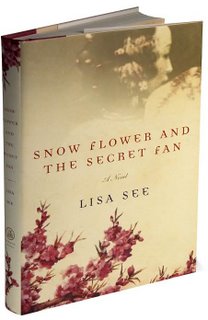Snowflower and the Secret Fan (Lisa See)
 In the popular fashion of Memoirs of a Geisha, this book tells the life story of a woman of Chinese descent. But Geisha takes place in Japan, not China, and Geisha is not nearly as ancient. Nonetheless, it is female-driven historical fiction at its finest. That is not to say the novel is literary fiction. Hardly. Far from. The fun of this novel lies in it’s somewhat realistic depiction of historical facts, not in the transcendent quality of the tale or writing style. In other words, I wouldn’t call it art. (Yes, yes. I am a horrible literary snob. I admit it.)
In the popular fashion of Memoirs of a Geisha, this book tells the life story of a woman of Chinese descent. But Geisha takes place in Japan, not China, and Geisha is not nearly as ancient. Nonetheless, it is female-driven historical fiction at its finest. That is not to say the novel is literary fiction. Hardly. Far from. The fun of this novel lies in it’s somewhat realistic depiction of historical facts, not in the transcendent quality of the tale or writing style. In other words, I wouldn’t call it art. (Yes, yes. I am a horrible literary snob. I admit it.) If any book is Oprah-worthy, it could be this one. Decently long and educated yet touching on all the aspects of ancient life that modern women would find interesting—gender equality, foot-binding, arranged marriages, etc. Naturally, as I modern woman I found these things interesting. Foot-binding? Yech.
 The best theme present in Snow Flower and the Secret Fan is the secret female language of Nu Shu. This is a series of characters entirely different from the male Chinese language that was supposed to be known by only women. They embroidered characters into cloth, painted them on fans… and kept them out of men’s hands. Nu Shu was a way for women to say what they really felt in a restrictive world that wouldn’t allow them to otherwise. When a woman died, all of her Nu Shu was burned at her gravesite so her words would travel with her to the next world. When a young child passed, those words would introduce the child to friends and ancestors who had passed before. A great concept and very interesting from a social history point of view.
The best theme present in Snow Flower and the Secret Fan is the secret female language of Nu Shu. This is a series of characters entirely different from the male Chinese language that was supposed to be known by only women. They embroidered characters into cloth, painted them on fans… and kept them out of men’s hands. Nu Shu was a way for women to say what they really felt in a restrictive world that wouldn’t allow them to otherwise. When a woman died, all of her Nu Shu was burned at her gravesite so her words would travel with her to the next world. When a young child passed, those words would introduce the child to friends and ancestors who had passed before. A great concept and very interesting from a social history point of view.
In the end, it is only historical fiction—a cute tale told within the confines of historical fact, an entertaining story about what could have happened. Not what actually happened. Such is obvious. Real life never has the high drama and tragedy of fiction, the crystallized lessons learned, the perfect balance and integration of themes. That is always manufactured and that is always, in the end, why historical fiction is not transcendent to me.
Tell me a true story—one that happened in actuality, no matter how dry or uneven or anticlimactic the facts are. Or, tell me a true story—one of literary fiction, where the emotions and ideas ring true to my heart and mind, where the people and events may not exist in the outside world but they express truth nonetheless, hitting the nail on the head. Yes yes, I know. I’m a snob.
 But I did like this book. I did. If only because it made me witness the process of foot-binding on the page and imagine the sound of breaking bones as you walking across the floor with your toes curled underneath the arch of your foot. Holy hell, ouch!
But I did like this book. I did. If only because it made me witness the process of foot-binding on the page and imagine the sound of breaking bones as you walking across the floor with your toes curled underneath the arch of your foot. Holy hell, ouch!


0 Comments:
Post a Comment
<< Home